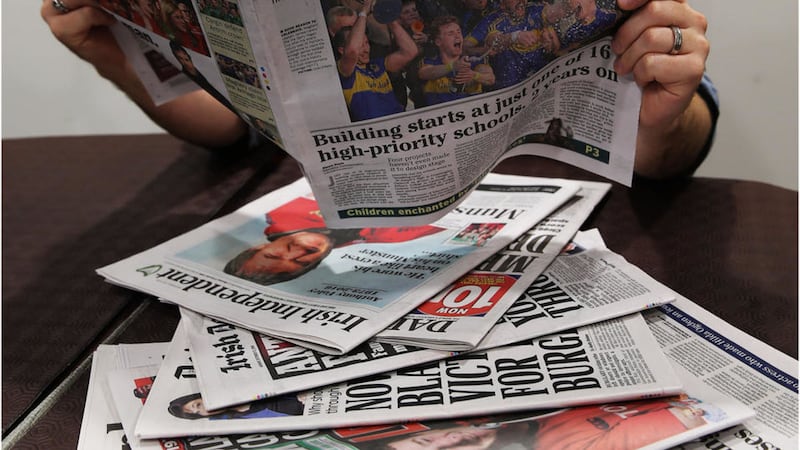How do you get your news? If you are reading this then its fair to assume that you still buy a daily newspaper, either as a hard copy over the counter or via a digital subscription.
But your constant source of news throughout the day, where does that come from?
Emerging technology and new media have changed the parameters for news digestion. Younger people in particular are likely to rely on Twitter and other social media outlets for their constant news hits.
The most recently published data shows that in the UK 65 per cent of Twitter users are under the age of 34; a third of Twitter users read their time-line more than 5 times per day while 80 per cent of Twitter users peruse the platform via their smart phone. Increasingly, that's how people are getting their news.
When I was a kid, the Irish News was the only morning news source that mattered, topped off by hourly BBC broadcasts and flagship shows like Talk-Back on the radio and for TV news hounds there was Scene Around Six. All topped off with the Belfast Telegraph, which was actually an evening newspaper at that time. I imagine that's a familiar tale across thousands of households in Northern Ireland. Mind you, when I was at school the Irish News cost 2p, and there was no sign of Twitter. #gettingold
But to quote the latest Nobel prize winner for literature, the times they are a changing, and so is the news industry. Newspapers which are holding their own need a hook, a sales pitch which goes beyond simply reporting the facts. Quality publications allow for deep analysis, columnists worth reading and a consistent and persistent approach to matters of the day such as the Nama and Trump scandals. It's no coincidence that the Irish News ticks those boxes while performing well in terms of copies sold.
Overall, though, the newspaper industry continues to grapple with a combination of falling sales and a reduced advertising revenue. Even in a post downturn economy the old grandees face huge pressure to stay in business. But it's very important that they do. In fact it's crucial.
In Dublin this week the Minister for Communications Denis Naughten has raised the prospect of state funding for ‘quality newspapers.’ Speaking to the Association of European Journalists in Dublin, he said that just as broadcasters receive a public subsidy, so too could the print journalism sector.
“I do believe it needs to be part of that debate because if we are going to provide quality journalism, if we are going to provide quality content then we need to look at how we are going to support that.”
If the BBC and RTE are able to avail of a public subsidy, then newspapers could make a legitimate argument that they too inform, educate and entertain the masses. The medium is different but the message is essentially the same. It’s a debate worth kick-starting.
While state funding for quality journalism is an interesting concept, it does raise the obvious and unwelcome spectre of state funds amounting to pressure from the Government of the day over the content of the newspapers it would theoretically be funding. That is a line which should not be crossed in a democracy.
Back in 2009 the then First Minister Peter Robinson, along with Martin McGuinness engaged in an extraordinary attempt to influence the day to day content of the Belfast Telegraph, by writing, not to the editor, but to the newspaper owner, Sir Tony O’Reilly. The First and deputy First Ministers were not happy that the ‘Tele' was being critical of the efforts of the Northern Ireland Executive.
The two men said: “We are writing to draw your attention to what we consider to be a quite serious deterioration in the Belfast Telegraph’s coverage of the work of the Executive and the Assembly.” In the same letter they asked for a meeting to discuss the issue.
Whatever reply was forthcoming we don't know, but when a political party, or a government, seek to influence the content of a news outlet, that is a step too far. That happens too when when an elected body like Derry and Strabane District Council pass motions calling for a boycott of a specific newspaper.
Such a motion is impractical, illogical and inherently anti democratic. Frankly, our new councils have more to be getting on with than seeking to influence or pressure the pubic or retailers over what newspapers they should buy or sell.
Newspapers and the media in general are absolutely vital components of a democratic state. Politicians may find grilling by the BBC's Stephen Nolan to be uncomfortable, but that's the arena they are operating in and they have to accept that.
I subscribe to digital editions of a couple of newspapers these days. It is an efficient and effective way of reading 'the paper' but still doesn't compare to holding the actual newspaper in your hand, in a way whereby the news can still, literally, leave a mark. Newspapers are here to stay - and rightly so.
:: Brendan Mulgrew is managing partner of MW Advocate. Twitter: @brendanbelfast
:: Next week: Jamie Delargy








